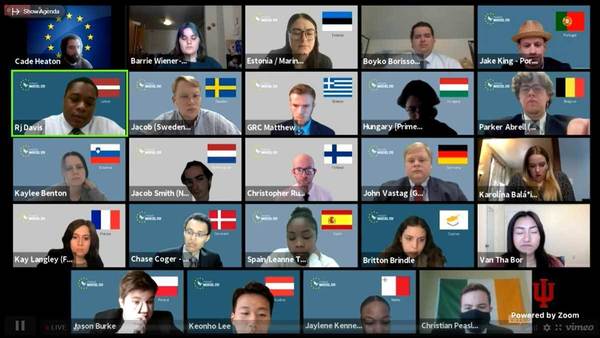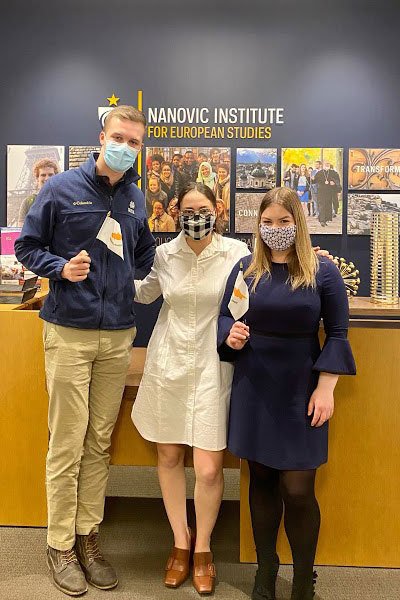
Few people who attend high school in the U.S. will make it to graduation without at least hearing about Model UN, but how many have ever participated in a Model EU? For three days in early April, some 140 undergraduates from across the region did just that at the virtual 2021 Midwest Model European Union (MMEU), hosted by Indiana University Bloomington.
Since the 1990s, students have gathered at this simulated summit to learn how Europe’s 27-member union debates and makes policy, mediates disagreements, and forges a path to compromise and greater integration. For the first time since the early 2000s, a team from Notre Dame, supported by the Nanovic Institute for European Studies, attended MMEU, this year as delegates from the Mediterranean island nation of Cyprus. Alexia Zolenski ’22 joined the team in part because of her experience as president of her high school Model UN club, and because of a new curiosity about the EU after she participated in the Dublin Global Gateway’s Winter Research Programme. “Before these experiences,” she says, “I didn’t know much about the EU, but now I do. That, in itself, makes the experience worthwhile and worth pursuing.”
When Anna Dolezal, Nanovic’s student programs assistant manager, spotted the annual event, she immediately identified an exciting opportunity for the institute to support a delegation from among the many Notre Dame students interested in European studies. Dolezal recognizes the value of programs like Model UN and Model EU as opportunities for students to learn great transferable skills. “Students learn how to argue for a position they might not hold themselves,” she explains, “they learn how to discern when to compromise on something and when to hold steady.”
To help the team prepare, Dolezal and Clare O’Hare, a doctoral candidate at the University of Notre Dame Law School and graduate fellow of the Nanovic Institute, co-taught a 1 credit class during the first half of the Spring ’21 semester. The goal was to offer preparation for the summit by helping the students understand how EU institutions work together and how individual countries are integrated into that structure. The group focused on the EU’s core institutions: the Commission, European Council, Council of Ministers, and the Parliament. They then examined a variety of policy portfolios from a Cypriot perspective, including justice and home affairs, the environment, finance and economics, and foreign affairs.

The immersive, simulative element of MMEU proved particularly valuable for the students and their instructors. “Coming from a background as a practicing lawyer,” O’Hare explains, “I am really interested in experiential classes, where students have a chance to apply what they learn to a real-life situation.” This approach, she believes, challenges students by demonstrating the connection between theory and praxis.
The careful preparation paid off. The Notre Dame teammates threw themselves into the debates, commanding negotiations, and engaging in after-hours zoom meetings with allies.
Olivier Whelan ’22 was voted best delegate in the Economic and Financial Affairs Council, one of only six students to win an award in the course of the weekend. Whelan appreciates how much the experience taught him about “demeanor, strategic cooperation with like-minded individuals, negotiation, [and] projection of power.” Honored by his accolade, Whelan attributes it to his strategy of asserting a disproportionate presence alongside representatives from more powerful member states. Although in command of only 0.2% of the vote, “it was through deft diplomacy” he says, “that the Cypriot delegation was able to play an outsized role on the committee and was able to outmaneuver great powers such as Germany, Spain, and France.”
And, it was fun. Zolenski described it as one of those rare experiences where she felt she could really hone practical skills, while thoroughly enjoying the process. It also gave her a chance to come out of her pandemic bubble, even though the summit was still virtual. “This reminded me,” she says, “that adapting to this entire situation doesn’t just include adapting to rules and regulations but adapting to your interests, and deliberately seeking these little niches and pockets of joy despite the circumstances.”
If you are interested in participating in a future Model EU, please contact Anna Dolezal at the Nanovic Institute.
The Notre Dame team, pictured left to right: Olivier Whelan ’22, Alexia Zolenski ’22, Grace Gariner ’22.
Not pictured: Britton Brindle ’23 & Clara Villatro Huezo MGA ’22.